Difference between pages "FM Towns emulators" and "J2ME Loader"
(→Emulators) (Tags: Mobile edit, Mobile web edit) |
(Tags: Mobile edit, Mobile web edit) |
||
| Line 1: | Line 1: | ||
| − | {{Infobox | + | {{Infobox emulator |
| − | | | + | |logo = JL.png |
| − | | | + | |logowidth = 150 |
| − | | | + | |version = {{JLVer}} |
| − | | | + | |active = Yes |
| − | | | + | |platform = [[Emulators on Android|Android]] |
| − | | | + | |target = [[Cellphone_emulators#J2ME (Java 2 Micro Edition)|Java 2 Micro Edition]] |
| − | | | + | |developer = [https://github.com/nikita36078 Nikita Shakarun] |
| − | | | + | |support = [https://www.paypal.me/nikita36078 PayPal] |
| + | [https://money.yandex.ru/to/41001670387745 Yandex Money] | ||
| + | |license = Apache 2.0 | ||
| + | |source = [https://github.com/nikita36078/J2ME-Loader/releases GitHub] | ||
| + | |website = | ||
| + | |prog-lang = Java | ||
}} | }} | ||
| − | + | '''J2ME Loader''' is a free and open-source [[Cellphone_emulators#J2ME (Java 2 Micro Edition)|Java 2 Micro Edition]] emulator <ref group=N> It's not exactly an emulator. It converts MIDlets to Android API and makes J2ME applications to run almost natively in [https://en.m.wikipedia.org/wiki/Dalvik_(software) Dalvik] or [https://en.m.wikipedia.org/wiki/Android_Runtime Android Runtime]</ref> | |
| + | for [[Emulators on Android|Android]] | ||
| + | It's written in Java. It supports most 2D games and also 3D with some limitations ([https://github.com/woesss/JL-Mod/wiki/Known-games,-powered-on-Mascot-Capsule-V3-3D Mascot Capsule 3D V3 Engine] games don't work). Emulator has a virtual keyboard, individual settings for each application, scaling support. This project is a fork of [https://github.com/NaikSoftware/J2meLoader J2meLoader]. | ||
| − | + | ==Overview== | |
| − | + | Released in 2017, the emulator is currently capable of playing around lot of games, more than 97.3% of the J2ME Library. This is currently the highest-compatibility J2ME emulator available. Converts .Jar files offline using its own resources. Easily launches both 2D & 3D apps. Samsung & Nokia API implemented. Supports different keyboard layouts and customization. It is highly accurate, with the right frame rate for each game, as well as vibration. Has slightly improved performance through hardware acceleration, but games won't run too fast. Runs almost every Nokia game, even ones that don't work with [[KEmulator]] or [[FreeJ2ME]], but fails with Sony Ericsson 3D engine (Mascot Capsule 3D), due to the fact that the Mascot Capsule 3D is almost difficult to port. This is common with [[JL-Mod]] emulator as well. | |
| − | == | + | <b>System requirements :</b> |
| − | + | Android 4.0 + | |
| − | + | ||
| − | + | ==Features== | |
| − | ! | + | |
| − | + | * Fast emulation. | |
| − | + | * High compatibility. | |
| − | + | * Bluetooth API support. | |
| − | + | * Touchscreen input support. | |
| − | + | * Supports different keyboard layouts and customization. | |
| + | * Individual settings for each application. | ||
| + | * Highly accurate, with the right frame rate (FPS Support) for each game, as well as vibration. | ||
| + | * Hardware acceleration support (but games won't run too fast). | ||
| + | * Accelerometer support. | ||
| + | * Scaling support. | ||
| + | * Support [[PPSSPP]] — [https://github.com/woesss/ppsspp_shaders shader filters]. | ||
| + | * Force fullscreen support. | ||
| + | And many more! | ||
| + | |||
| + | ==Known bugs and issues== | ||
| + | |||
| + | * Moscot Capsule 3D Engine games doesn't works. | ||
| + | |||
| + | ==Download== | ||
| + | {| cellpadding="4" | ||
|- | |- | ||
| − | + | |align=center|{{Icon|APK-big}} | |
| + | |'''[https://install.appcenter.ms/users/nikita36078/apps/j2me-loader/distribution_groups/testers Automatic Builds]''' | ||
|- | |- | ||
| − | + | |align=center|{{Icon|APK-big}} | |
| − | |align= | + | |'''[https://github.com/nikita36078/J2ME-Loader/releases GitHub][https://f-droid.org/app/ru.playsoftware.j2meloader F-Droid]''' |
| − | |[ | ||
| − | |||
| − | |||
| − | |||
| − | |||
| − | |||
|- | |- | ||
| − | + | |align=center|{{Icon|APK-big}} | |
| − | |align= | + | |'''[https://play.google.com/store/apps/details?id=ru.playsoftware.j2meloader Play Store]''' |
| − | |[https:// | + | |} |
| − | | | + | |
| − | + | ==Screenshots== | |
| − | + | ||
| − | + | {| class="wikitable mw-sortable" | |
| − | | | ||
|- | |- | ||
| − | | | + | |[[File:DR.jpg|300px]] |
| − | + | |[[File:SU.jpg|300px]] | |
| − | |||
| − | | | ||
| − | |||
| − | |||
| − | |||
| − | |||
| − | |||
| − | |||
| − | | | ||
| − | |||
| − | |||
| − | |||
| − | |||
| − | |||
| − | |||
| − | |||
| − | |||
| − | |||
| − | |||
| − | |||
| − | |||
| − | |||
| − | |||
| − | |||
|- | |- | ||
| + | |[[File:C4D.jpg|300px]] | ||
| + | |[[File:MI3.jpg|300px]] | ||
|} | |} | ||
| − | === | + | ==Compatibility List== |
| − | |||
| − | |||
| − | + | <B>[https://github.com/nikita36078/J2ME-Loader/wiki/List-of-Tested-Java-Games-(Touchscreen) List of The Tested Java Games (Touchscreen)]</B> | |
| − | |||
| − | + | <B>[https://github.com/nikita36078/J2ME-Loader/wiki/List-of-Tested-Java-Games-(Non-Touchscreen) List of The Tested Java Games (Non Touchscreen)]</B> | |
| − | |||
| − | + | <B>[https://github.com/nikita36078/J2ME-Loader/wiki/List-of-Java-Games-with-Bugs List of The Java Games with Bugs]</B> | |
| − | |||
| − | + | ==See also== | |
| − | |||
| − | + | * [[JL-Mod]] | |
| − | + | * [[EKA2L1]] | |
| − | + | ==External links== | |
| − | = | + | * [https://discord.com/invite/Ag4rcpz Official Discord server] |
| − | + | * [http://4pda.ru/forum/index.php?showtopic=824201 4pda.ru Discussion] | |
| + | * [https://forum.xda-developers.com/android/apps-games/app-j2me-loader-t3777889 Xda-dev Discussion] | ||
==References== | ==References== | ||
| − | + | <references group=N /> | |
| − | |||
| − | = | ||
| − | |||
| − | [[Category: | + | [[Category:Mobiles emulators]] |
| − | [[Category: | + | [[Category:Cellphone emulators]] |
| − | [[Category: | + | [[Category:Android emulation software]] |
| − | |||
Revision as of 15:08, 10 October 2021
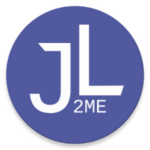
| |
| Developer(s) | Nikita Shakarun |
|---|---|
| Latest version | 1.7.9 |
| Active | Yes |
| Platform(s) | Android |
| Emulates | Java 2 Micro Edition |
| Support ($) | PayPal |
| Programmed in | Java |
| License | Apache 2.0 |
| Source code | GitHub |
J2ME Loader is a free and open-source Java 2 Micro Edition emulator [N 1] for Android It's written in Java. It supports most 2D games and also 3D with some limitations (Mascot Capsule 3D V3 Engine games don't work). Emulator has a virtual keyboard, individual settings for each application, scaling support. This project is a fork of J2meLoader.
Contents
Overview
Released in 2017, the emulator is currently capable of playing around lot of games, more than 97.3% of the J2ME Library. This is currently the highest-compatibility J2ME emulator available. Converts .Jar files offline using its own resources. Easily launches both 2D & 3D apps. Samsung & Nokia API implemented. Supports different keyboard layouts and customization. It is highly accurate, with the right frame rate for each game, as well as vibration. Has slightly improved performance through hardware acceleration, but games won't run too fast. Runs almost every Nokia game, even ones that don't work with KEmulator or FreeJ2ME, but fails with Sony Ericsson 3D engine (Mascot Capsule 3D), due to the fact that the Mascot Capsule 3D is almost difficult to port. This is common with JL-Mod emulator as well.
System requirements : Android 4.0 +
Features
- Fast emulation.
- High compatibility.
- Bluetooth API support.
- Touchscreen input support.
- Supports different keyboard layouts and customization.
- Individual settings for each application.
- Highly accurate, with the right frame rate (FPS Support) for each game, as well as vibration.
- Hardware acceleration support (but games won't run too fast).
- Accelerometer support.
- Scaling support.
- Support PPSSPP — shader filters.
- Force fullscreen support.
And many more!
Known bugs and issues
- Moscot Capsule 3D Engine games doesn't works.
Download
| Automatic Builds | |
| GitHubF-Droid | |
| Play Store |
Screenshots
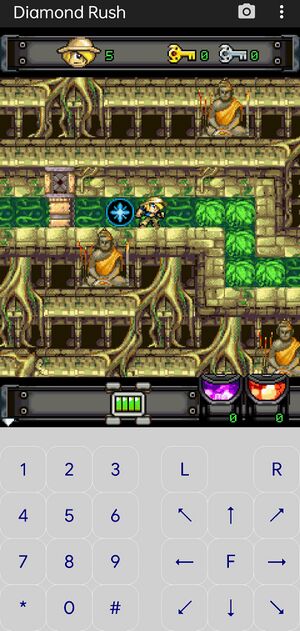
|
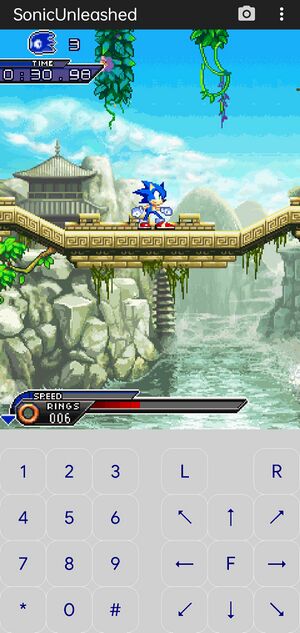
|
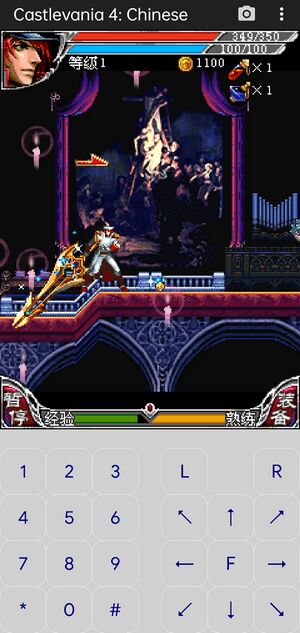
|
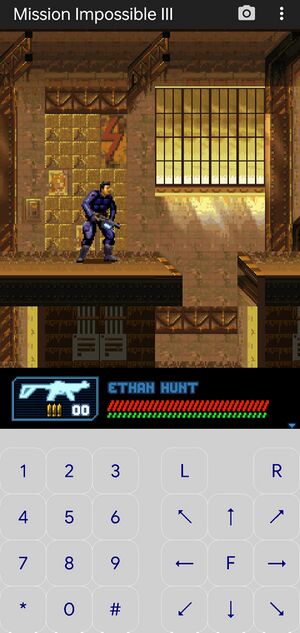
|
Compatibility List
List of The Tested Java Games (Touchscreen)
List of The Tested Java Games (Non Touchscreen)
List of The Java Games with Bugs
See also
External links
References
- ↑ It's not exactly an emulator. It converts MIDlets to Android API and makes J2ME applications to run almost natively in Dalvik or Android Runtime